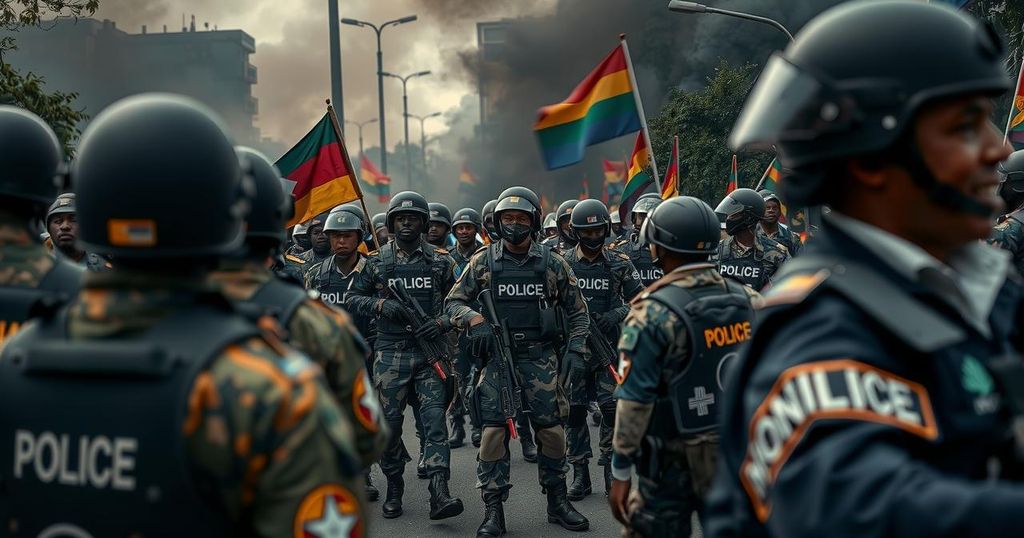Mozambique Election Unrest: Child Casualties from Police Violence Spark Outrage

In Maputo, Mozambique, protests following the presidential election have turned deadly, with children among the casualties. Antonio Juaquim, a 16-year-old, was shot during these demonstrations against Frelimo’s alleged electoral misconduct. Human Rights Watch highlights increased police violence in response to protests, raising serious concerns about government accountability and human rights in Mozambique amid rising public discontent.
In the capital of Mozambique, Maputo, outrage has erupted following the tragic death of a 16-year-old boy named Antonio Juaquim, who was shot while participating in a pots-and-pans protest against the results of the recent presidential election. His killing, part of a broader wave of violence during protests against the ruling party, Frelimo, highlights the ongoing political turmoil in the country after former liberation movement claimed a significant electoral victory. Opposition figures have alleged electoral misconduct, inciting their supporters to demonstrate against the perceived injustice.
The protests commenced soon after the electoral commission declared Frelimo’s presidential candidate, Daniel Chapo, the victor with a reported 71% of the vote. Meanwhile, his main rival, Venâncio Mondlane, has accused the state of engineering a fraudulent election and has managed to rally the populace against Frelimo, resulting in nightly demonstrations marked by the banging of household items. Tragically, these protests have turned lethal, resulting in the deaths of numerous individuals, including children.
The toll is alarming, with reports indicating that approximately 40 individuals have perished due to police actions, escalating fears regarding public safety and government accountability. Human Rights Watch has been monitoring these developments, emphasizing the heavy-handed response from the police as they confront dissenting voices. Commanders within the police force have characterized the situation as a necessary use of force to maintain order, accusing protesters of violent provocations. However, various activists and opposition party leaders contend that this reflects a blatant repression of civic rights, with claims of excessive force tarnishing the state’s actions.
This unprecedented violence in Mozambique’s history of protests raises serious questions about the current government’s legitimacy and ability to serve the populace adequately. The unfortunate events have catalyzed sorrow and anger among the youth, who yearn for substantial avenues towards employment and economic independence rather than blind loyalty to historical political figures and parties. As calls for justice and accountability echo, the future of Mozambique remains clouded by uncertainty amid burgeoning civil unrest and demands for better governance.
Appeals for justice for victims like Antonio and Alito Momad, another young victim, are growing, as communities demand accountability for actions taken against their citizens. The societal fabric continues to be threatened as many citizens are left mourning, hoping one day Mozambique will return to a state where their rights and lives are protected instead of jeopardized by those in power. The ongoing developments will significantly influence the country’s trajectory as it grapples with the consequences of its recent political crisis.
The recent elections in Mozambique have ignited significant unrest, primarily due to allegations of electoral fraud and a heavy-handed response from the authorities against dissenters. As the former liberation movement, Frelimo has maintained power since Mozambique’s independence, discontent has arisen among the populace, particularly younger generations dissatisfied with the government’s accountability and their economic prospects. Nightly protests, encouraged by opposition leader Venâncio Mondlane, express widespread rejection of the election’s outcome and dissatisfaction with the long-standing ruling party. The violence that has ensued has resulted in numerous casualties, underscoring the fragile state of democracy and human rights in Mozambique today.
The unfolding crisis in Mozambique underscores a critical juncture in the country’s democratic journey, marked by violence and public outcry against what many perceive as authoritarian governance. The deaths of young citizens like Antonio and Alito during protests reflect deeper frustrations among the populace regarding governance, economic opportunities, and civil rights. As the situation develops, the legitimacy of the ruling party is increasingly called into question, with immense pressure mounting for accountability and justice. The collective grief and anger may well shape the future of Mozambique as citizens demand not only recognition of their suffering but also fundamental changes in how their governance operates.
Original Source: www.bbc.com







